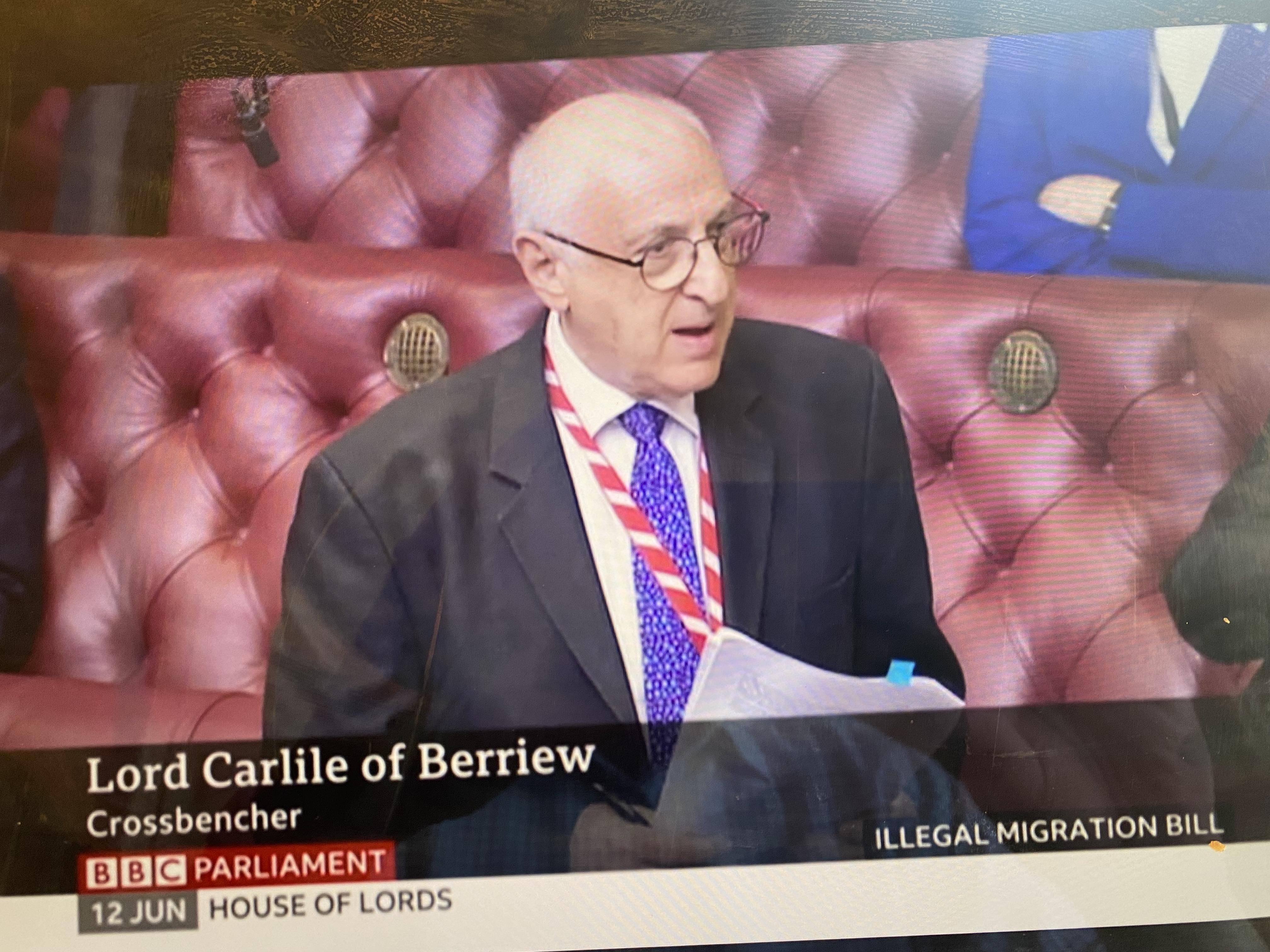This is Blog No 31
Salute Lord Carlile of Berriew!
Previously Independent Reviewer of Terrorism Legislation, this high-profile ex-LibDem MP is a powerful voice in the House of Lords. On Monday, he used his eloquence to denounce aspects of the Illegal Migration Bill in a devastating and entertaining 10 minute speech which I recommend to Consultation GuRU readers.

You can find it on BBC I-Player (https://tinyurl.com/ycyzsx5h from 17.50 mins to 29.00 mins!
The Lords are considering amendments to the Bill at Report stage and on Monday, were discussing Schedule One – the long list of countries to which the legislation will deem it safe to deport an alleged illegal immigrant. There are 57 in all, which sounds impressive, though note that it includes Liechtenstein, Luxembourg and Albania!
Lord Carlile wanted to know how this had been compiled. In his words:-
One is entitled to assume—I ask the Minister to confirm that this assumption is accurate in this case—that, in the
preparation of the list in Schedule 1, the Government have carried out due diligence on the 57 countries listed as
safe territories to which a person may be removed. Was the placing of a country on the list in Schedule 1
preceded by consultation? Who should that consultation have been with? Let us start with the ambassadors and
high commissioners representing the United Kingdom in those countries.
We all know that the Foreign, Commonwealth and Development Office is well staffed with people here in London who
are experts in and who man desks on those countries. Were they consulted before the names of those countries
were added to the list in Schedule 1? I ask this question because, having been through the list with a fine-toothed
comb looking at every single country on it, I cannot accept that whatever inquiries were made could really be
described as diligent. Due diligence in the world in which many of us who work in the professions operate is an
absolute given in every instance.
His Lordship illustrated human rights abuses in a couple of countries that were on the list.
And then, a Parliamentary first?
Possibly. I quote verbatim
Maybe the Government could have limited their due diligence to a little look at ChatGPT. I did that. I looked
at ChatGPT to see what that automated artificial intelligence said about some of these countries, and here I
turn to Kenya.
ChatGPT said:“Kenya has made progress in protecting human rights”, but ChatGPT is a master of
understatement. It continued, “but there are still some concerns related to police brutality, extrajudicial
killings, and discrimination against marginalized communities such as LGBTI individuals, refugees, and
people living with disabilities. The government has taken steps to address these issues, but more work
needs to be done to ensure that human rights are fully respected and protected in the country”.
Amid laughter, Lord Carlile made his point. No-one expects a formal consultation on matters of detail, but Parliament expects a degree of professionalism when contentious legislation is brought before it. On this occasion, and despite enormous public interest – here and internationally, and concerns expressed by literally hundreds of stakeholder groups and thousands of potential migrants that might be affected, the Government has still not produced an Impact Assessment. So regardless of how many have speculated as to what will happen when this Bill is enacted, Ministers have not committed themselves to what they expect to be its consequences. Either it does not know – in which case it should not bring the Bill before Parliament. Or it does know, but doesn’t want to tell anyone. That is just dishonest.
Lord Carlile has pinpointed just one of an extended catalogue of controversial aspects which human rights campaigners and the Government’s political opponents have highlighted. But in doing so, he illustrates the retreat from the rigour of policy-making.
He calls it due diligence. It is a phrase familiar to business leaders before they commit sums to new products or ventures. It is used by investors before their mergers and acquisition whizzkids decide to buy someone else’s business. It is used by bankers or mortgage lenders before they advance us some money.
It is also used when contemplating change or establishing a policy.
Lord Carlile instinctively moved from asking to see the due diligence to enquiring about who was consulted.
We should ask more often!
For the record, the learned Lord DID receive an answer.
Lord Murray of Blidworth – Parliamentary Under-Secretary at the Home Office explained “The countries listed in the schedule are an amalgam of previous pieces of legislation where the safety of those countries has been established in that legislation.”
In other words – the countries are there, “ because we said they were safe last time …” !!!
Oh dear!
As for asking ChatGBT, this opens up another can of worms – and is a matter for other Blogs. At least, on Monday on the floor of the House of Lords, he attributed his findings to this remarkable AI innovation.
Will everyone else be as honest?
See Rhion's Speeches and Presentations
For More like this - free of charge: SUBSCRIBE now
Leave a Comment
I hope you enjoyed this post. If you would like to, please leave a comment below.